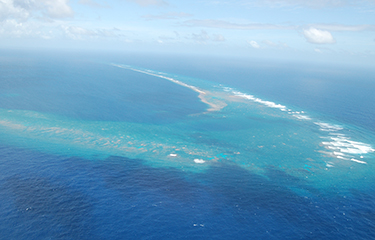NOAA has started the process to designate a massive area in the Pacific Ocean a marine sanctuary, following up on a proposal by the administration of U.S. President Joe Biden.
The proposal, made in late March, would create a new marine sanctuary using the National Marine Sanctuaries Act around the Pacific Remote Islands area, a set of islands in the central Pacific Ocean. The proposal would include the existing Pacific Remote Islands Marine National Monument and currently unprotected areas of land and water, covering the full extent of the U.S.’s exclusive economic zone.
If approved, the proposed sanctuary would cover an area of 770,000 square miles.
“The Biden-Harris Administration and Department of Commerce are committed to bold conservation goals through the America the Beautiful initiative,” U.S. Secretary of Commerce Gina Raimondo – who also has authority over NOAA – said in a release. “Sanctuary designation would bring to bear NOAA’s capacity and expertise in research and management of coastal and marine resources, maritime heritage and archaeology, and public education and outreach in order to protect the unique ecological and cultural resources of the Pacific Remote Islands.”
The region, NOAA said, is home to “atolls, shoals, seamounts, banks, and reefs” that are home to a diverse array of tropical marine life – providing a haven for wildlife, corals, sharks, and more. The sanctuary designation would also, according to advocates, protect endangered species in the region.
“The Pacific Remote Islands ecosystems face persistent threats from hazards, such as marine debris, invasive species and climate change,” NOAA Administrator Rick Spinrad said. “Designating this incredibly important area as a national marine sanctuary would complement and strengthen existing efforts to preserve the region’s natural, cultural and historic values.”
Fishing groups in the region, however, are opposed to the sanctuary on the grounds that fishing is sustainably managed. A meeting of the Western Pacific Regional Fishery Management Council (WPRFMC) featured several speakers who voiced direct opposition to Biden’s proposal, according to a WPRFMC release.
Commonwealth of the Northern Mariana Islands Governor Arnold Palacios asked Biden to keep the small communities who rely on fishing in mind when establishing widespread sanctuaries.
“It really is about communications, respect for each other, respect for what we represent, and respect for federal and regulatory agencies,” Palacios said. “Government policies have profound impacts on small communities. I am not opposed to conservation and management measures—that is the purpose of the Council. But we need to start talking, respecting, and considering the consequences of our decisions.”
American Samoa Department of Marine and Wildlife Resources Archie Soliai Chair said federal actions have been done “without consultation of our Pacific communities and are very disrespectful.”
“Where is the environmental justice and equity that this administration has prioritized?” he said.
Now that the new designation process has started, the public can comment on the proposal through 2 June 2023. NOAA said it is also hosting in-person meetings, with the option to join virtually, to gather input on “ boundaries, compatible uses, threats a new sanctuary would address, how best to promote marine science and education initiatives and other topics.”
Photo courtesy of Susan White/United States Fish and Wildlife Service







